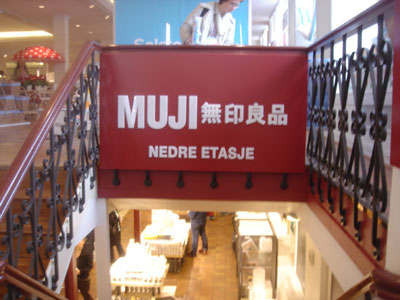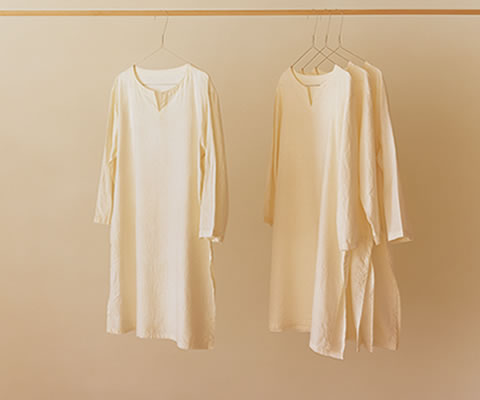
Since the establishment of its first flagship store in Castle Peak, Tokyo, in 1983, it has been 21 years since it was founded. It has immediately received the support and recognition from consumers. After many years of intensive cultivation, there are now 121 companies in Japan. The stores and 146 dealerships are truly national brands and are the largest Life Style Store in Japan. According to the results of local surveys in Japan, MUJI has a 51.1% favorability rating and is ranked first because it provides shopping safety, product popularity, and reasonable prices.
MUJI has grown from the original dozens of products to about 5,000 products today, from toothbrushes to cars (yes, cars, Muji March with Nissan), foods and appliances, glasses shop to Meal Muji restaurant, and real products. Muji.Net, a store to the online world, becomes a complete life proposal shop, and everything can be made from the morning to the end of life.
In the morning, you can wear the “Muji†robe and wake up in the “Muji†bed, then brush your teeth with the “Muji†toothbrush and drink the coffee from the “Muji†coffee machine. On the sofa of "Muji", listening to the sound of "Muji" sent music ... everything, simple, not artificial, artificial, but carefully and carefully to take care of our daily needs.

No name is brand name
As early as the exaggerated 1980s, MUJI put forward the idea of ​​protecting the health and reminded people to appreciate the beauty of raw materials and materials. When the trend of multi-american aesthetics became popular, Muji did the opposite and continued to subtract and eliminate: remove the trademark, remove all unnecessary processing and colors, and simply package it. The material and the function itself.
This was not without fresh results for the Yapi family, who were tired of pursuing brand-name and luxury living at the time. "Emphasizing spirit and playing simplicity" has become the root cause of the success of Muji's product upgrading from the product level to the cultural level. What's more important is that when Muji's debut, that is, the middle class as its main target, he successfully created a tasteful cultural image. The niche image is loved by today's yuppies who are pursuing Life Style.
The Japanese magazine "Casa Brutus" has produced a special edition devoted to the secret of the success of MUJI products: MUJI never emphasizes itself, and even print ads see the propaganda word "Wang Po Selling Melons," preferring to spend more time. Try to find ways to make life easier and more delicious.
For example, the designers of MUJI observed that in the narrow and narrow Japanese homes, the bed occupied an important position, sleeping, reading, eating, watching TV, and even entertaining friends may all be required. Therefore, the development of a mattress with four short legs can be used as a sofa, with a sofa bed similar to the sofa fabric, so that the owner will not appear cramped in the hospitality. For another example, they observed that the last action the average person took before going to bed was to remove the glasses and turn off the bedside light. The first action the next morning was to grope for glasses by hand. Therefore, the development of a bedside lamp with a base recessed in the center allows the glasses to lean against the light poles for easy access. "We have only one design goal: to meet the needs of life. It is very simple, but it is very difficult." Muji designer said.
Moreover, MUJI snack products are also full of knowledge. Like maple sugar sandwich biscuits, Muji insisted to use only wheat flour produced by Tokachi Hokkaido, because it was found that low pollution, balanced climate, and low sea salt content in the area contribute to the growth of wheat, and in order to comply with consistent "low processing" In principle, Muji does not believe that wheat flour has better whiteness and higher grades. It insists on not dehydrating excessively to preserve the content of germs and increase the proportion of natural nutrients. This shows that MUJI respects food and does not waste.
Muji also attaches great importance to the texture of the material. It is said that their designers often travel around the world to find the most concise and practical materials, and purchase large quantities to reduce costs. In the first two years, they found the Tiansi cotton in Xinjiang as a home service. The market responded well and won a good reputation and sales performance. The emphasis on environmentally friendly recycled materials and the simplification of packaging to the most basic conditions have also earned MUJI the support of environmentalists.
Unique marketing strategy
Mr. Matsui Chungji, president of Muji, likes to use the term "idea" frequently. "The so-called 'good product plan' is to unify clothing, daily necessities, foods and other goods into one market under the same concept. One idea and multiple commodities are the biggest differences between us and other companies."
"The so-called marketing is how to get as close as possible to the customer's feelings and ideas. Therefore, the company attaches great importance to the exchange of information between customers in the development of goods." The concept of product development and two-way information exchange are two keywords that we look at. To the good marketing plan unique marketing strategy.
In the planning of marketing strategy, the most important thing is to collect and analyze customer information. The Good Plans Corporation collects 6,000 customer information per month from the following four channels. Internet pages (500), letters and telephones (1500 pieces) received by the customer center, postcards (1000 pieces) attached to the catalogue, and information contact cards (3000 pieces).
Among the above four kinds of channels, the product catalog channel is the most representative of the good product plan business strategy. "Muji has been sold as a retail business, mainly through shops. All of our stores have product catalogs for all goods. There is almost no retail company to do this." President Matsui is proud to say .
Look at this number again - 7.15 million. This is the total number of MUJI catalogues issued during the year of 1998. The promotional cost of MUJI's input is about 2% of sales. Muji promotional promotion costs about 1.9 billion yen a year, of which about half, that is, 900 million to 1 billion yen is the cost of the distribution of the catalog. Commodity catalogs have been classified and edited and are divided into six categories: clothing, furniture, home appliances and knitwear, kitchen and tabletop supplies, household goods, health and beauty, stationery, and bicycles. 95% of catalogs are obtained directly from the store by customers. The customer's catalog from the store is filled with the latest product information.
Clothing is the main battlefield for the development of new products. About 70% of the products are updated every year, and the turnover is very fast. MUJI classified clothing that is susceptible to changes in market conditions and seasonality into three types of planning and development. That is: seasonal goods (sales period is 60 days), flat season goods (sales period is 90 days), and annual commodities (sale period is six months to one year). Among them, due to the short sales time of seasonal goods whose main target is the specific period of midsummer and winter, the failure of the product planning will directly result in operating losses.
In order to keep the losses to a minimum, marketing campaigns must be oriented in the right direction and proceed with caution. No matter how many well-selling commodities are not unconditionally "indiscriminately developed." The product development of Muji has consistently implemented the principle of “unified conceptâ€. “In the development of Muji products, the design, raw materials, and prices of the related products have stipulated conditions that must be complied with. For example, we strictly abide by the design principles of no patterns, checks, stripes, etc., and use only black and white and brown in color. , blue and other prescribed colors. No matter how popular popular colors are in the year, they never go beyond design principles to develop products."
The persistent pursuit of development philosophy has created a brand image of Muji. China is a major production base for its apparel. 100% of the best-selling knitwear produced in Muji is produced in China, and 70% of apparel is also produced in China. Another 20% is produced in Japan, and the remaining 10% is produced in Asia and other countries. In China, the production of apparel is carried out in accordance with a production commission contract signed with a Chinese company, and no direct operation or investment has been adopted. This is because to maintain the flexibility of operations, in order to most effectively respond to the ever-changing business environment, we must maintain a high degree of flexibility and adopt a flexible business strategy. This is the basic principle for the construction of foreign production plans by Muji.
Yiso Jewelry Co., Ltd. , http://www.ywcrown.com